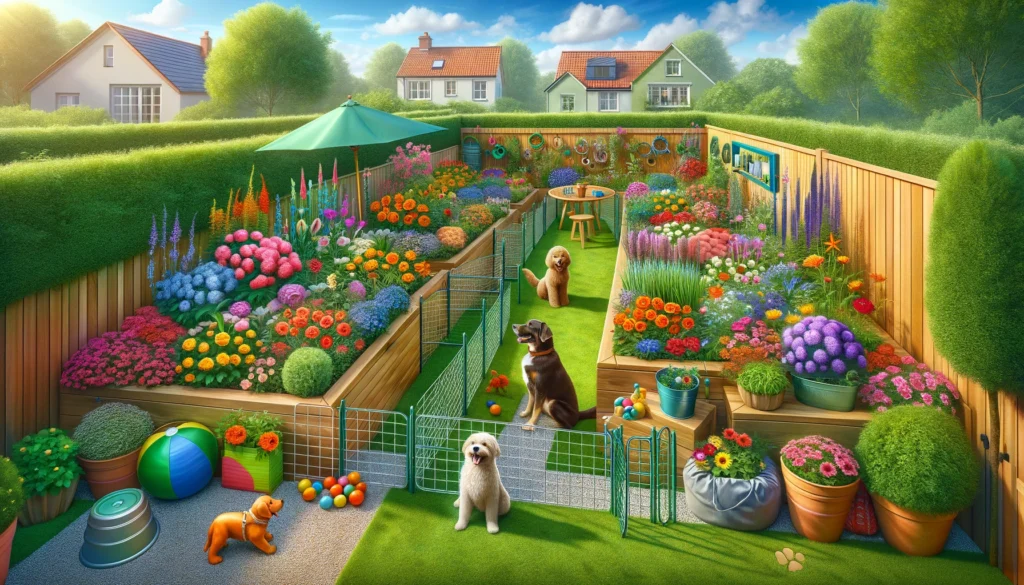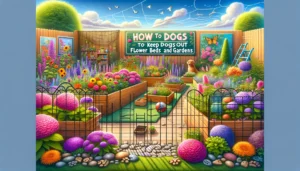Learn how to keep dogs out of flower beds and gardens with our guide. Discover pet-friendly barriers, repellents, and training tips for a beautiful, safe garden.
Whether you’re employing fencing, using safe repellents, or training your dog, this guide provides all the tips you need for a beautiful, pet-safe garden. Ideal for dog owners who love gardening but want to protect their green spaces.
Outline of Article: How to Keep Dogs Out of Flower Beds and Gardens
- Introduction
- Understanding Why Dogs Love Flower Beds and Gardens
- Natural Instincts
- Curiosity and Exploration
- Preventative Measures to Protect Your Flower Beds
- Physical Barriers
- Scent Repellents
- Training Your Dog
- Physical Barrier Solutions
- Fencing
- Raised Beds
- Garden Nets
- Natural and Chemical Repellents
- Homemade Natural Repellents
- Commercial Chemical Repellents
- Training Techniques for Keeping Dogs Out
- Positive Reinforcement
- Boundary Training
- Creating a Dog-Friendly Zone
- Designating a Play Area
- Using Dog-Safe Plants
- Monitoring and Adjusting Strategies
- Regular Checks
- Making Adjustments
- Conclusion
- FAQs
- Can I use any type of fencing to keep dogs out of my garden?
- Are chemical repellents safe for my plants and dog?
- How long does it take to train a dog to stay out of flower beds?
- Can dogs distinguish between their play area and the garden?
- What if none of these strategies work?
How to keep dogs out of flower beds and gardens
Introduction
As dog owners and gardening enthusiasts, we often find ourselves at a crossroads, trying to protect our beloved flower beds and gardens from our furry friends. While dogs naturally enjoy exploring and playing in outdoor spaces, their curiosity can lead to damaged plants and a messy garden. In this guide, we’ll explore effective strategies to harmoniously keep dogs out of your flower beds and gardens, ensuring the safety of your plants and the happiness of your pet.
Understanding Why Dogs Love Flower Beds and Gardens
Natural Instincts
Dogs are naturally curious creatures with instincts that drive them to dig, sniff, and explore their environment. This behavior can be traced back to their wild ancestors, who dug for food and shelter. Understanding these instincts is crucial in finding solutions to protect your garden.
Curiosity and Exploration
The variety of scents and textures in a garden can be irresistible to a dog. This curiosity, while a sign of a healthy and stimulated pet, can spell disaster for your flower beds.
Preventative Measures to Protect Your Flower Beds
Physical Barriers
Implementing physical barriers is one of the most effective ways to keep dogs out. These can range from fences to raised garden beds, offering a clear boundary for your pet.
Scent Repellents
Both natural and commercial scent repellents can deter dogs from entering garden areas. These can include citronella, vinegar, or specially formulated commercial products.
Training Your Dog
Training your dog to understand garden boundaries through commands or boundary training can be a long-term solution, fostering respect for the garden space.
Physical Barrier Solutions
Fencing
Fences not only define the boundary of your garden but can also be a decorative element. The height and material should be chosen based on your dog’s size and ability to jump or dig.
Raised Beds
Raised garden beds can discourage dogs from stepping into the planting area, protecting your flowers and vegetables from being trampled.
Garden Nets
Garden nets or chicken wire can be a less intrusive way to protect specific areas or plants within your garden.
Natural and Chemical Repellents
Homemade Natural Repellents
Creating a repellent using ingredients like citrus peels or coffee grounds can provide a safe and eco-friendly option to keep dogs at bay.
Commercial Chemical Repellents
For those looking for a ready-made solution, commercial repellents designed to be safe for pets and plants can be effective.
Training Techniques for Keeping Dogs Out
Positive Reinforcement
Rewarding your dog for staying out of the garden or following commands can reinforce good behavior without the need for punishment.
Boundary Training
Teaching your dog the limits of where they can go can be achieved through consistent training and reinforcement.
Creating a Dog-Friendly Zone
Designating a Play Area
Allocating a specific area for your dog to play and dig can satisfy their natural instincts without harming your garden.
Using Dog-Safe Plants
Choosing plants that are safe for dogs can reduce the risk of poisoning if they decide to nibble on them.
Monitoring and Adjusting Strategies
Regular Checks
Regularly monitoring your garden and your dog’s behavior can help you adjust strategies as needed, ensuring both the garden’s and your pet’s well-being.
Making Adjustments
Be prepared to tweak your strategies based on effectiveness and your dog’s behavior. Flexibility is key to finding a balance between a healthy garden and a happy dog.

Conclusion: How to keep dogs out of flower beds and gardens
Protecting your flower beds and gardens from your dogs requires understanding, patience, and a bit of creativity. By employing a combination of physical barriers, repellents, and training, you can create a garden that thrives alongside your pet. Remember, the goal is to ensure the safety and happiness of your furry friend while keeping your garden beautiful and intact.
FAQs: How to keep dogs out of flower beds and gardens
The type of fencing should depend on your dog’s size and jumping ability. A taller fence may be necessary for larger dogs.
When used as directed, most commercial chemical repellents are safe. However, it’s important to choose products specifically designed to be safe around pets and plants.
The time it takes can vary widely depending on the dog’s temperament and the consistency of the training. Some dogs may learn quickly, while others may take longer.
Yes, with consistent training and clear boundaries, dogs can learn to distinguish between their designated play area and the garden.
If you’ve tried multiple strategies without success, consulting a professional dog trainer or behaviorist can offer personalized advice and training techniques tailored to your dog’s needs.

Can you be more specific about the content of your article? After reading it, I still have some doubts. Hope you can help me.
Thanks for sharing. I read many of your blog posts, cool, your blog is very good.
Thank you for your kind words and continued support! It’s always encouraging to hear from regular readers who find value in the content.If You are interested you can also watch my other content website-https://mindfulinsuranceclaim.com on another topics.
Your article helped me a lot, is there any more related content? Thanks!
I’m really glad to hear that my article helped you feel hopeful!
Thanks for sharing. I read many of your blog posts, cool, your blog is very good.
I’m really glad to hear that my article helped you feel hopeful!